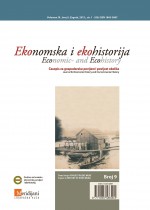SREDNJEVEŠKE RAČUNSKE KNJIGE KOT VIR ZA OKOLJSKO ZGODOVINO
MEDIEVAL ACCOUNTBOOKS AS A SOURCE FOR ENVIRONMENTAL HISTORY
Author(s): Matjaž BizjakSubject(s): History
Published by: Društvo za hrvatsku ekonomsku povijest i ekohistoriju - Izdavačka kuća Meridijani
Keywords: account books; seigneuries; agriculture; stockbreeding; fischery; forest; water power
Summary/Abstract: Account books are a late medieval product of disseminating literacy in the administrative spheres of various governmental structures, especially land estates and bodies of city self-administration. As documents of financial control over the transactions of some economic-administrative organisation unit, they reach into practically all fields of human activity, thus offering – perhaps more substantially than any other medieval source – an abundance of data from the daily life of the then society. Primitive economy in premodern periods and its exclusive drawing on natural sources (both energy and raw material) is logically reflected in the structure of data revealed by medieval account books. The latter, namely, contain a wide array of news about the use of natural wealth; wood (for construction purposes, as well as for the purposes of heating and obtaining lime and coal); the driving force of watercourses; river deposits of gravel and quarries; minerals; forest and water food sources (hunting, fishing, and grazing). And, furthermore, they point to the success or failure of man’s struggle against natural sources (elimination of the consequences of natural disasters, regulation of river ways). The paper at hand is an overview of medieval account books in the Slovenian territory and provides a rough evaluation of their significance for the research of various themes in the field of environmental history. Thereby it places its main focus on the types, quality and quantity of information provided by the aforementioned sources. One of the essential potentials that distinguish account books and related sources from other such documents is the possibility to conduct quantitative research. Although this possibility is rather limited in the case of environmentally-related themes, we may nevertheless conclude that quantitative research may, to a certain extent, be conducted on the basis of certain groups of data (I shall highlight those concerning agriculture, cattle farming, fishing, ironwork industry, construction), while in other instances only qualitative research is feasible. In general, it may be concluded that medieval account books provide, only to a lesser extent, an independent or at least main source for solving problems of environmental history. Their information value may partly be enhanced with a combined use of additional written sources, for the medieval period mostly land registers and documents, but more results may be anticipated from interdisciplinary research.
Journal: Ekonomska i ekohistorija - Časopis za gospodarsku povijest i povijest okoliša
- Issue Year: 2013
- Issue No: 9
- Page Range: 81-96
- Page Count: 16
- Language: Slovenian

